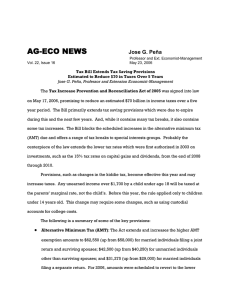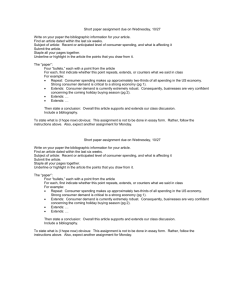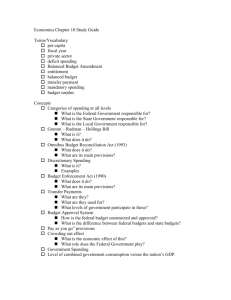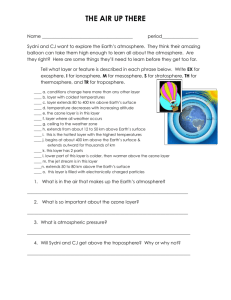Tax Extenders Bill Summary
advertisement
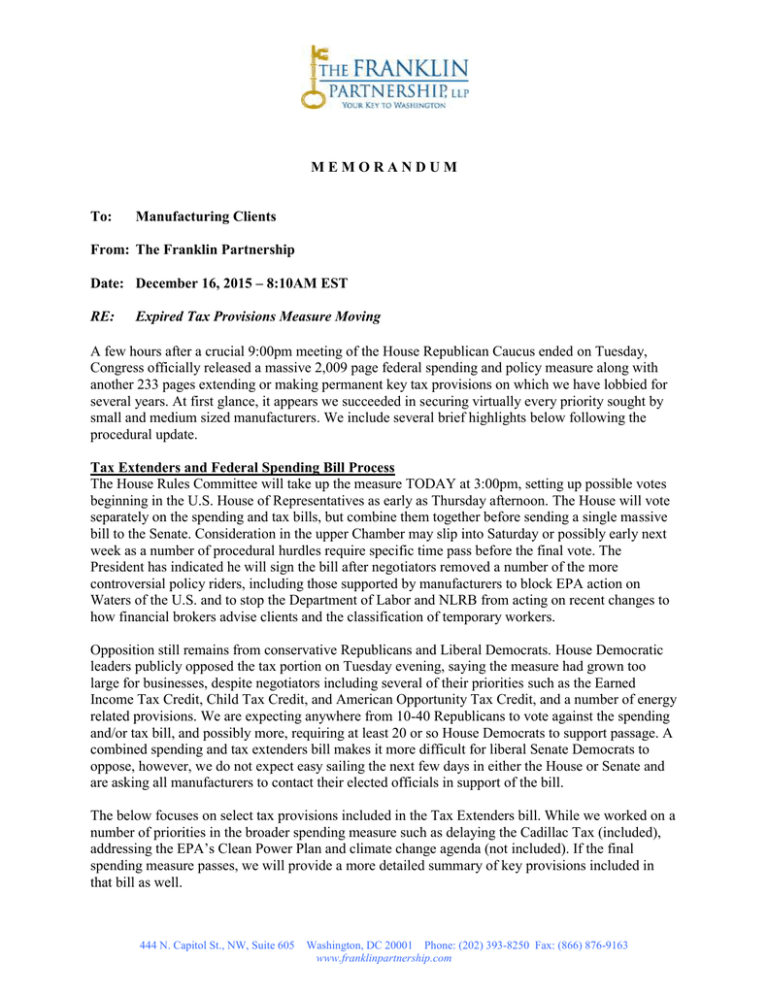
MEMORANDUM To: Manufacturing Clients From: The Franklin Partnership Date: December 16, 2015 – 8:10AM EST RE: Expired Tax Provisions Measure Moving A few hours after a crucial 9:00pm meeting of the House Republican Caucus ended on Tuesday, Congress officially released a massive 2,009 page federal spending and policy measure along with another 233 pages extending or making permanent key tax provisions on which we have lobbied for several years. At first glance, it appears we succeeded in securing virtually every priority sought by small and medium sized manufacturers. We include several brief highlights below following the procedural update. Tax Extenders and Federal Spending Bill Process The House Rules Committee will take up the measure TODAY at 3:00pm, setting up possible votes beginning in the U.S. House of Representatives as early as Thursday afternoon. The House will vote separately on the spending and tax bills, but combine them together before sending a single massive bill to the Senate. Consideration in the upper Chamber may slip into Saturday or possibly early next week as a number of procedural hurdles require specific time pass before the final vote. The President has indicated he will sign the bill after negotiators removed a number of the more controversial policy riders, including those supported by manufacturers to block EPA action on Waters of the U.S. and to stop the Department of Labor and NLRB from acting on recent changes to how financial brokers advise clients and the classification of temporary workers. Opposition still remains from conservative Republicans and Liberal Democrats. House Democratic leaders publicly opposed the tax portion on Tuesday evening, saying the measure had grown too large for businesses, despite negotiators including several of their priorities such as the Earned Income Tax Credit, Child Tax Credit, and American Opportunity Tax Credit, and a number of energy related provisions. We are expecting anywhere from 10-40 Republicans to vote against the spending and/or tax bill, and possibly more, requiring at least 20 or so House Democrats to support passage. A combined spending and tax extenders bill makes it more difficult for liberal Senate Democrats to oppose, however, we do not expect easy sailing the next few days in either the House or Senate and are asking all manufacturers to contact their elected officials in support of the bill. The below focuses on select tax provisions included in the Tax Extenders bill. While we worked on a number of priorities in the broader spending measure such as delaying the Cadillac Tax (included), addressing the EPA’s Clean Power Plan and climate change agenda (not included). If the final spending measure passes, we will provide a more detailed summary of key provisions included in that bill as well. 444 N. Capitol St., NW, Suite 605 Washington, DC 20001 Phone: (202) 393-8250 Fax: (866) 876-9163 www.franklinpartnership.com The Franklin Partnership, LLP Expired Tax Provisions Measure Summary December 16, 2015 – 8:10AM EST Expired Tax Provisions Measure Select Summary (Tax Extenders) Permanent R&D with AMT Claim – Extends R&D Tax Credit for 2015; Starting in 2016, R&D is made permanent and allows small businesses ($50 million or less in gross receipts) to claim the credit against their Alternative Minimum Tax (AMT) liability. Permanent Section 179 Equipment Expensing – Extends Section 179 for 2015 restored to the $500,000 with a $2 million phase-out indexed to inflation starting in 2016. Also treats air conditioning and heating units placed in service beginning after 2015 as eligible for expensing. Extends Bonus Depreciation through 2019 with AMT Claim – Extends from January 1, 2015 through 2019 Bonus Depreciation through 2019 with an additional year for certain property with a longer production period. The depreciation percentage is 50 percent for property placed in service during 2015, 2016 and 2017 and phases down, with 40 percent in 2018, and 30 percent in 2019. The provision continues to allow taxpayers to elect to accelerate the use of Alternative Minimum (AMT) credits in lieu of Bonus Depreciation for property placed in service during 2015 and beginning in 2016, increases the amount of unused AMT credits a taxpayer may claim in lieu of Bonus. Two-Year Moratorium on Medical Device Excise Tax – The measure suspends for all of 2016 and 2017, the 2.3-percent excise tax imposed on the sale of medical devices imposed under the Affordable Care Act. Commercial Building Energy Efficiency Deduction Extended – Extends through 2016 the above-theline deduction for energy efficiency improvements to lighting, heating, cooling, ventilation, and hot water systems of commercial buildings. Extends Hiring Long-Term Unemployed Credit – Extends through 2019 the work opportunity tax credit and beginning in 2016, allows employers who hire qualified long-term unemployed individuals (27 weeks or more) to claim up to 40 percent of the first $6,000 of wages paid. Extends Empowerment Zones for Two-Years – Extends through 2016 the tax benefits for certain businesses and employers operating in empowerment zones (economically distressed areas), and the tax benefits available include tax-exempt bonds, employment credits, increased expensing, and gain exclusion from the sale of certain small-business stock. Exclusion of Small Business Stock Held for Five Years – Extends the temporary exclusion of 100 percent of the gain on certain small business stock for non-corporate taxpayers to stock acquired and held for more than five years. Permanent Five Year Built-in Gains for S-Corporations – Permanently extends the rule reducing to five years from ten the period for which an S-Corporation must hold its assets following conversion from a C-Corporation to avoid the tax on built-in gains. S-Corporation Charitable Donations – Permanently extends the rule providing that a shareholder’s basis in the stock of an S corporation is reduced by the shareholder’s pro rata share of the adjusted basis of property contributed by the S corporation for charitable purposes. 501(c)(4) Gift Tax Exemption – Treats transfers to organizations exempt from tax under section 501(c)(4), (c)(5), and (c)(6) as exempt from the gift tax. www.franklinpartnership.com
